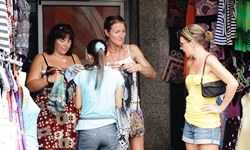In 2011, Thailand welcomed over 19.1 million international visitors, of which 60% were repeat visitors. Almost all of these trips were safe and without incident.
However, foreign governments do urge their citizens to take responsibility for their own personal security while travelling overseas and use the same common sense and sound judgment when abroad as they would at home. It’s easy to let your guard down when on holiday, especially in a country like Thailand where the residents are friendly and the atmosphere is relaxed.

According to the US Department of State, the crime threat in Bangkok remains lower than that in many American cities and violent crimes against foreigners are relatively rare. However, as is the case elsewhere around the world, there are incidents of crimes of opportunity such as pick pocketing, purse snatching and burglary. There are occasional reports of passports, wallets and other valuables being stolen. This is usually done by thieves who cut into purses or bags with a razor and remove items without being notices.
Travellers are advised to be cautious in areas where such incidents are more likely to occur. These include crowded markets, tourist sites and bus or train stations, and festivals. It is also best to avoid isolated neighbourhoods, short cuts, narrow alleys and poorly-lit streets, especially late at night.
In secluded beach destinations and remote islands, independent travellers should exercise caution. They are advised to avoid all secluded areas and stay in the vicinity of other travellers whenever possible.
The TAT would like all visitors to have a pleasant and comfortable stay in the Kingdom. We urge everyone to take precautionary measures and use common sense to ensure a trouble-free holiday.
Women Travellers
The total number of women visitors to Thailand is on the increase. The ratio of male to female visitors to Thailand is now 65:35. Thailand welcomed over 19.1 million visitors in 2011. Of these, five million were women travellers. Thailand is also home to a large number of female expatriate residents.
Women travellers are urged to use the same common sense travelling overseas that they would at home. This includes avoiding isolated neighbourhoods, short cuts, narrow alleys or poorly lit streets; avoid travelling alone at night; and also refrain from doing things that they would typically not do when back home. Women travellers are advised to dress appropriately for the local culture and to refrain from sun-bathing in the nude or topless to avoid being placed in a high-risk situation.
Both the Foreign Office and Lonely Planet warn women to be vigilant when travelling alone in Thailand following incidents of drinks being spiked, sexual assault and pick pocketing. The Koh Samui Tourism Association is more specific in its advice for female visitors: “Women especially should not accept an invitation from a stranger to walk on the beach at night, no matter how attractive he or she may be.”
Scams
Scams involving gems, city tours, entertainment venues and credit cards are common, especially in areas heavily visited by tourists. Credit cards should be used only in reputable, established businesses, and the amount charged should be checked for accuracy.
The Tourism Authority of Thailand (TAT) receives over a thousand complaints each year from visitors who have been cheated on gem purchases. Gem scams usually follow a predictable pattern.
Someone approaches a tourist outside of a well-known tourist attraction says that the attraction is closed. The friendly stranger quickly gains the tourist’s confidence and suggests a visit to a temple that is supposedly open only one day per year. The stranger then mentions in passing that a special once-a-year government-sponsored gem sale is going on, and directs the tourist to a waiting tuk-tuk. At the temple, another stranger — sometimes a foreigner — engages the tourist in conversation and also mentions the “special” gem sale. The tourist agrees to go look at the gem shop, and is soon convinced to buy thousands of dollars worth of jewels that can supposedly be sold in the U.S. for a 100% profit. When the tourist actually has the goods appraised, they turn out to be of minimal value, and the shop’s money-back guarantee is not honoured. No matter what a tout may say, no jewellery stores are owned, operated, or sponsored by the Thai Government or by the Thai royal family.
A traveller who has fallen victim to a gem or other scam should contact the local branch of the Tourist Police, or call their country-wide toll-free number: 1155.
Food Safety
Thailand is one of the world’s largest exporters of fresh and processed foods to markets such as the US, the European Union, the Middle East, Japan, Australia and other countries where exporters are required to meet very strict standards of food safety. This is excellent news for Thailand’s food and beverage, tourism and hospitality industry sectors. Chefs and cooks throughout the country have quick and convenient access to some of the freshest and best ingredients with which to prepare the vast range of culinary delights that have made Thailand a hub of cosmopolitan cuisine.
Food served in F&B outlets in hotels, resorts, restaurants and food courts in shopping malls and plazas generally meet internationally recognized health and hygiene standards. Opt for well-established restaurants frequented by the locals. The overall presentation and atmosphere of a restaurant generally offer visible clues as to its general outlook on food safety.
Ice cubes and shaved ice served in hotel F&B outlets and restaurants in resorts, food courts in shopping malls and plazas are generally safe for consumption. Tap water should not be assumed to be safe for drinking and should be boiled before drinking. Bottled water is widely sold.
Visitors wishing to experience the real “taste of Thailand” the way locals do are advised to be selective in their choice of food vendors. Always look for clues that may be an indicator of the food safety standards being observed. For example, does a stall have access to clean running water for washing up?
As a general guideline, it is safe to consume dishes that are freshly-prepared and cooked, either by boiling or frying. Meat and poultry should be well cooked and served hot. Avoid uncooked, under cooked or lightly grilled freshwater fish and seafood. This includes shellfish such as mussels, oysters, clams, crabs and shrimp. Also avoid consuming fish, seafood or meat with any kind of unusual odour.
Bars and Entertainment Venues
Although most bars and entertainment venues operate honestly, some, especially in tourist areas, at times try to charge exorbitant amounts for drinks or unadvertised cover charges, and threaten violence if the charges are not paid. If victimized in this fashion, travellers should not attempt to resolve the problem themselves, but should instead pay the price demanded and then seek out a nearby Tourist Police officer for help in getting restitution. (If no officer is nearby, the Tourist Police may be contacted toll-free by dialing 1155.)
There have been occasional reports of drugging with sedatives by prostitutes or unscrupulous bar workers for the purpose of robbery. Tourists have also been victimized by drugged food and drink, usually offered by a friendly stranger, sometimes posing as a fellow traveller on an overnight bus or train. In addition, casual acquaintances met in a bar or on the street may pose a threat.
Travellers are advised to avoid leaving drinks or food unattended, and should avoid going alone to unfamiliar venues. Do not accept offers of food or drink from any friendly strangers.
Some trekking tour companies, particularly in Northern Thailand, have been known to make drugs available to trekkers. Travellers should not accept drugs of any kind, as the drugs may be altered or harmful. The use or sale of narcotic drugs is illegal in Thailand.
Illegal Drugs
Penalties for possession or use of, or trafficking in, illegal drugs in Thailand are severe. Convicted offenders can expect long prison sentences under harsh conditions, and often heavy fines as well. Thailand also has a death penalty for serious drug offenses.
Natural Dangers
Strong seasonal undercurrents at popular beach resorts pose can pose a threat to swimmers. During the monsoon season from May through October, drowning is the leading cause of death for tourists. Some, but not all, beaches have warning flags to indicate the degree of risk (red flag: sea condition dangerous for swimming; yellow flag: sea condition rough, swim with caution; green flag: sea condition stable).
Tourists also need to be aware that jellyfish may be found in the waters along beaches or washed up on shore during certain times of the year. Although not all jellyfish are dangerous to humans, stings from the most venomous varieties can cause death within a few minutes if the venom reaches the heart and causes cardiac arrest. According to jellyfish experts, the best line of protection is to remain aware, vigilant and avoid taking any risks. Please check with staff at the accommodations where you are staying regarding local conditions.
Beach Safety
Strong seasonal undercurrents at popular beach resorts pose can pose a threat to swimmers. During the monsoon season from May through October, drowning is the leading cause of death for tourists. Some, but not all, beaches have warning flags to indicate the degree of risk (red flag: sea condition dangerous for swimming; yellow flag: sea condition rough, swim with caution; green flag: sea condition stable).
Tourists also need to be aware that jellyfish may be found in the waters along beaches or washed up on shore during certain times of the year. Although not all jellyfish are dangerous to humans, stings from the most venomous varieties can cause death within a few minutes if the venom reaches the heart and causes cardiac arrest. According to jellyfish experts, the best line of protection is to remain aware, vigilant and avoid taking any risks. Please check with staff at the accommodations where you are staying regarding local conditions.
Safety in National Parks
Conditions during tropical monsoon rains can make travel within national parks difficult and hazardous. Weather conditions can change very quickly. Fog and low clouds tend to hang low over the landscape. Cliffs may collapse under their own weight when the soil underlying the sandstone cap is eroded by heavy rain. Heavy rains can also cause landslides and flash floods in the streams that flow down the mountain slope.
For the latest updates on national parks, visit the National Park, Wildlife and Plant Conservation Department Web site.
Trekking in Border Areas
Tourists should obtain information from Thai authorities about whether official border crossing points are open, and should cross into neighbouring countries only at designated crossing points. Licensed guides can help ensure that trekkers do not cross inadvertently into a neighbouring country.
Political protests and Demonstrations
As is the case in most democratic countries, the right to freedom of expression and peaceful assembly are fundamental rights of the Thai people. As in other democracies, there are those in Thailand who oppose the government and sometimes choose to express their views by staging protests and taking to the streets.
Political protests tend to be peaceful in nature and are generally limited to a designated area. In other areas of Bangkok and the rest of Thailand, life continues as usual during these protests.
In the event of an escalation of political tension, retail and tourism operators act responsibly. If a protest situation in a nearby area steadily escalates and could potentially pose a threat to the safety and well-being of their visitors, customers or guests, tourist attractions, shopping malls, retail and service establishments in the immediate area will be closed.
Visitors are advised to monitor local media for announcements of possible demonstrations and avoid the areas where demonstrations might occur.
Information for Victims of Crime
The loss or theft abroad of a passport should be reported immediately to the local police and the nearest embassy or consulate.
If you are the victim of a crime while in Thailand, in addition to reporting to local police, please contact your embassy or consulate for assistance. The embassy/consulate staff can, for example, help you find appropriate medical care, contact family members or friends and explain how funds could be transferred. Although the investigation and prosecution of the crime is solely the responsibility of local authorities, consular officers can help you to understand the local criminal justice process and to find an attorney if needed.
The local equivalent to the “911” emergency line in Thailand is 191.
For more information or assistance, contact the TAT Tourist Information Center Hotline at 1155, 24 hours a day.
Additional Information
(The following information sources are not part of the TAT News Room)
Thailand Ministry of Foreign Affairs: Diplomatic and Consular List
US Department of State: A Safe Trip Abroad
UK Foreign & Commonwealth Office: Staying safe and healthy




